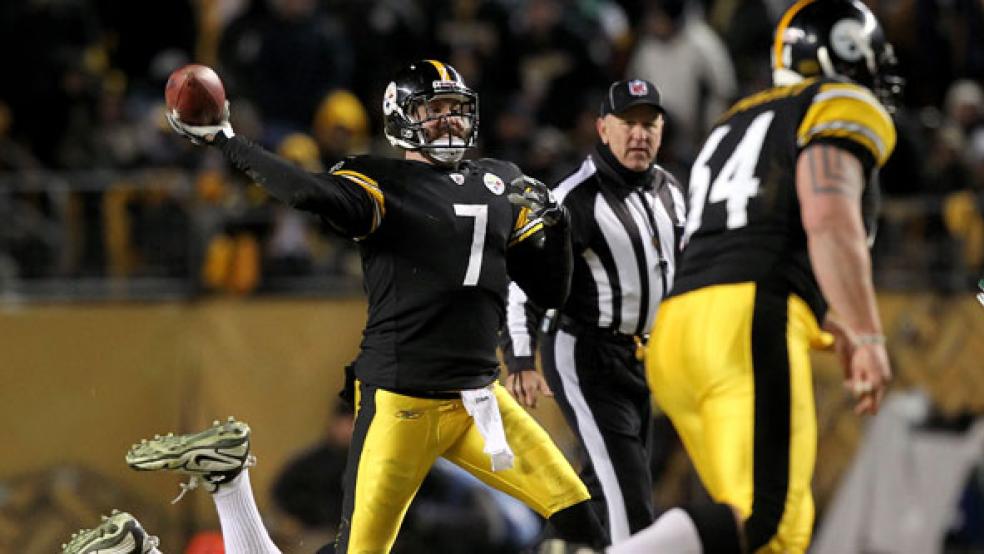Imagine the largest snap count in football: “One million, 110 million, 611 million, 720 million — hike.” Those are all real numbers tagged to this year’s Super Bowl battle between the Pittsburgh Steelers and the Green Bay Packers, the biggest economic juggernaut in all of American sports. But this is one contest where there will be more than one winner. Sponsor Papa John’s expects to deliver 1 million pizzas; 110 million viewers will watch the game on TV; the Dallas Metroplex will rake in $611 million; and the NFL got a $720 million check from Fox for this season’s broadcast rights, which includes the Super Bowl.
PricewaterhouseCoopers estimates that visitors to Dallas will spend $202 million on everything from hot dogs to hotel rooms. If the accounting firm is right, Super Bowl XLV could beat last year’s record $197 million.
Big Broadcast Bucks
For Fox, which saw prime-time viewership fall off 20 percent this year, the Super Bowl is a guaranteed megahit. A 30-second Super Bowl spot is fetching between $2.8 million and $3 million this year, and with each Super Bowl broadcast more ad-filled than the last (2010’s Super Bowl XLIV featured 47 minutes and 50 seconds of advertising, 18 percent more than in 2001), Fox’s potential ad revenues may exceed $200 million. The NFL won’t see that money, of course, but it will benefit from a record viewership in other ways – those eyeballs and the ad revenues that accompany them can be a great negotiating point when the league’s television deal comes up for renewal after the 2013 season.
Returning this year after a hiatus in 2009 is Hugh Hefner’s storied Playboy Super Bowl Party, with tickets for its Friday night bash starting at $1,250 (minimum purchase: 10 tickets). Held at the Aloft Hotel (renamed the Bud Light Hotel for the week before the game), the party is one of the weekend’s hottest tickets, but it’s not the only big bash: Some 130 corporate sponsors, from Audi to
ESPN, are throwing Super Bowl blowouts.
With just 9 percent of Super Bowl tickets sold to locals and an estimated 147,000 out-of-state visitors in town, pigskin partygoers will spend freely on everything from limos and rental cars to meals, airfare and souvenirs. Tourists will pay a premium: A room with a queen-sized bed at the Super 8 Motel in Arlington Northwest is going for about $1200 for Super Bowl weekend (Saturday and Sunday) – about 10 times as much as the usual February rate.
Everything’s Tops in Texas
The Metroplex will fill government coffers with an estimated $46 million in state and local tax revenue. And importantly, the event will showcase the Metroplex as a destination for future conventions. Cowboys Stadium, the $1.2 billion arena financed in part by $325 million from the city of Arlington, may be the best and most concrete proof that everything is definitely bigger in Texas.
A capacity crowd at the 105,000-seat Cowboys Stadium will be the biggest live audience ever to see a Super Bowl. The prices make a weekend at the Arlington Super 8 look like a steal: Even in unseasonably cold weather, tickets for the game’s outdoor Party Plaza are selling for nearly twice their $200 face value. Online ticket vendor StubHub reported buyers paying an average of $3,268 per ticket; area brokers said that tickets with a $600 face value were regularly selling for $2,000 or more. Deluxe tickets are, unsurprisingly, much pricier – one Texas buyer had the honor of paying $73,163 for a ‘ring of honor’ suite, which includes 15 seats, drinks and a catered meal for 10.
Even parking spots near the stadium are selling for nearly $1,000. “It’s completely out of control,” Arlington resident Brian Baker told NBC’s Dallas affiliate. “But supply and demand – that’s the name of the game.”
In Las Vegas, a projected record number of bettors may break the 2006 record of $94.5 million. The city, so bruised by the recession, is seeing a comeback with hotels booked at 84 percent of capacity and seats in the big casinos’ sports books in big demand.
Most fans, of course, will enjoy the game from their much less pricey couch-potato perches. Add up the 7.5 million parties hosted by the TV audience – including dipping chips into nearly 70 million pounds of guacamole washed down by nearly 50 million cases of beer – and Super Bowl Sunday may just be what the economy needs to end the recession.


